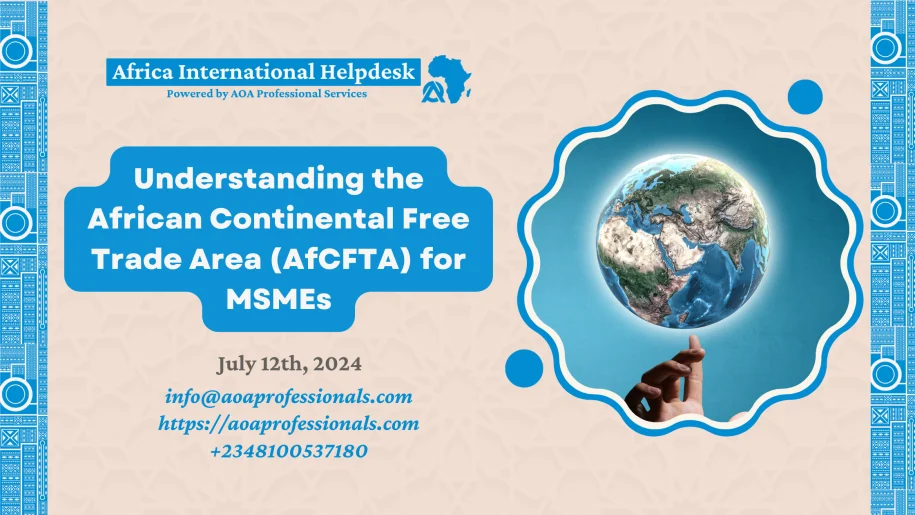The African Continental Free Trade Area (AfCFTA) is a flagship project of the African Union’s Agenda 2063, aimed at creating a single continental market for goods and services, with free movement of businesspersons and investments. It aims to boost intra-African trade by reducing tariffs and other barriers, thereby fostering economic growth and development across the continent.
Key Objectives of AfCFTA
- Create a Single Market: Facilitate the movement of goods, services, and investments.
- Increase Intra-African Trade: Enhance trade relations among African countries.
- Industrial Development: Promote economic diversification and industrialization.
- Job Creation: Generate employment opportunities through expanded market access.
- Sustainable Development: Promote inclusive and sustainable economic growth.
Benefits for MSMEs
- Market Access: MSMEs can access a broader market of over 1.2 billion people, providing opportunities to scale up operations.
- Reduced Tariffs: Lower tariffs on intra-African trade reduce costs, making African products more competitive.
- Economic Diversification: Encourages MSMEs to diversify their products and services.
- Investment Opportunities: Attracts investment in local industries and infrastructure, benefiting MSMEs.
- Business Collaboration: Facilitates partnerships and collaborations with other African businesses.
Case Studies
Case Study 1: Fashion and Apparel Industry in Nigeria
Company: A Nigerian MSME producing traditional and contemporary fashion.
Challenge: High tariffs and limited market access restricted their ability to export to other African countries.
AfCFTA Impact:
- Market Expansion: With reduced tariffs, the company expanded its market to Ghana, Kenya, and South Africa.
- Revenue Growth: Increased sales and revenue by 30% within the first year of AfCFTA implementation.
- Job Creation: Hired additional staff to meet the growing demand, thus contributing to local employment.
Case Study 2: Agricultural Exports in Kenya
Company: A small Kenyan agribusiness exporting fresh fruits and vegetables.
Challenge: Export barriers and high costs limited their export potential to neighboring countries.
AfCFTA Impact:
- Cost Reduction: Lowered export costs by 15% due to tariff elimination.
- Market Penetration: Entered new markets in Rwanda, Uganda, and Tanzania.
- Technological Investment: Invested in better packaging and cold storage technologies to meet the increased demand and ensure product quality.
Case Study 3: ICT Start-up in South Africa
Company: A South African tech start-up providing digital solutions for small businesses.
Challenge: Difficulty in expanding services to other African countries due to regulatory differences and high costs.
AfCFTA Impact:
- Harmonized Regulations: Benefited from efforts to harmonize ICT regulations across member states.
- Service Expansion: Expanded its digital solutions to Botswana, Namibia, and Zambia.
- Strategic Partnerships: Formed partnerships with local businesses in new markets to tailor solutions to specific needs.
Challenges and Recommendations for MSMEs
1. Understanding Regulatory Requirements: MSMEs need to understand the varying regulatory requirements across member states to ensure compliance.
Recommendation: Invest in legal and regulatory expertise or consult with local trade bodies.
2. Enhancing Product Quality: To compete in new markets, MSMEs must ensure their products meet international standards.
Recommendation: Adopt quality management systems and seek relevant certifications.
3. Building Capacity: MSMEs often lack the capacity to scale up production quickly.
Recommendation: Seek funding opportunities and invest in capacity-building programs.
4. Leveraging Technology: Technology can help MSMEs streamline operations and reach new markets more effectively.
Recommendation: Invest in digital tools and platforms that enhance efficiency and market reach.
5. Access to Information: Lack of information on trade opportunities and market conditions can hinder MSMEs.
Recommendation: Utilize resources from trade associations, chambers of commerce, and government agencies to stay informed.
Conclusion
The AfCFTA presents significant opportunities for MSMEs in Africa to expand their markets, reduce costs, and enhance competitiveness. By understanding the benefits and addressing the challenges, MSMEs can effectively leverage the AfCFTA to achieve growth and contribute to the continent’s economic development. The success stories from various sectors demonstrate the potential impact of the AfCFTA, encouraging more MSMEs to take advantage of this continental agreement.


2 Comments
infiniti-salon.com
What an intriguing article! The website’s seamless navigation made it even more
enjoyable to explore.
Rebecca Sunday Ufot-Ayoola
Thank you for your kind words. We’re glad you found the website easy to explore. We’d keep publishing interesting articles for your enjoyment